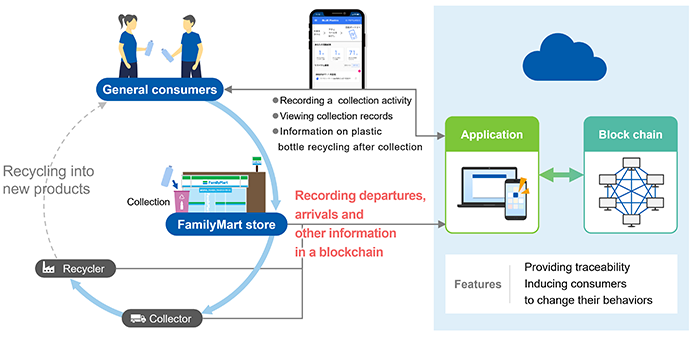Asahi Kasei Announces Demonstration Trial in BLUE Plastics Project for Recycling at FamilyMart
A demonstration trial with general consumers to verify the value of plastic bottle recycling traceability
July 6, 2022
Asahi Kasei Corp.
Asahi Kasei Corporation, FamilyMart Co., Ltd., ITOCHU Corporation, and ITOCHU Plastics Inc. (CIPS) today reached an agreement for a demonstration trial (the Trial) to recycle plastic beverage bottles with the use of a prototyped traceability system at actual FamilyMart stores under the BLUE Plastics project. BLUE stands for “Blockchain Loop to Unlock the value of the circular Economy.” The project aims to construct a digital platform for the circular economy. The first round of the Trial is scheduled to begin as early as fall 2022.
1. Background
Actions to enable the reuse of plastic and the utilization of recycled plastic are gaining momentum. However, it has been difficult for consumers to learn about the recycling chain and the end use of products derived from recycled plastic. Asahi Kasei created a digital platform for “closed-loop recycling” in 2021 in order to promote the recirculation of resources. Leveraging blockchain technology, this platform prevents data falsification in the recycling chain and ensures traceability.
By conducting the Trial, Asahi Kasei, FamilyMart, ITOCHU and CIPS will investigate whether or not the visualization of the plastic bottle recycling chain will change consumers' behavior and what impact it will have on the reuse of recycled plastic, as well as assess the value of the traceability.
2. Outline of the Trial
Participating FamilyMart stores will have a scannable QR Code on plastic bottle recycling bins that consumers can scan via smartphone app to record the number of bottles deposited. These consumers can then view the progress of the bottles throughout the recycling chain after collection. This traceability is made possible through blockchain technology.
- Purpose
- Operate a traceable system for recycling used plastic bottles to examine hypotheses about changes in consumer behavior and the effect of the system, as well as identify issues with system implementation
- Period
- Fall 2022 or later
- Locations
- Selected FamilyMart stores in the 23 wards of Tokyo
- Role of each company
- Asahi Kasei
- Planning and design of the Trial and provision of a prototype traceability system
- FamilyMart
- Consideration, implementation and verification of the Trial at actual stores
- ITOCHU and CIPS
- Support and collaboration for implementation of the traceability system in society
 Diagram of the Trial
Diagram of the Trial
3. Actions of individual companies
Asahi Kasei
Asahi Kasei is endeavoring to develop a comprehensive digital platform that will be open broadly to the businesses involved in the recycling chain and to consumers. Asahi Kasei believes that to achieve resource recirculation in society it is necessary to visualize the plastic recycling chain to provide an environment where recycled plastics can be used, while it is difficult for a single company acting alone to solve social issues that require ensuring both resource recirculation and convenience.
FamilyMart
To help realize a sustainable society, FamilyMart is carrying out activities in accordance with its basic policy of "addressing the SDGs in its original way," stated in its medium-term management plan with a view toward the achievement of its quantifiable goals in the three categories of reducing greenhouse gases, measures to address plastics and the reduction of food waste, which are defined as medium-to long-term environmental goals in the FamilyMart Environmental Vision 2050. As part of its measures to address plastics, FamilyMart uses recycled polyethylene terephthalate (PET) resin containers for its salads and cold noodle meals. Since July 2021, it has been using recycled plastic bottles made of 100% bottle-to-bottle recycled PET resin for its private-branded mineral water. Through a wide variety of measures including the above, FamilyMart aims to increase the percentage of materials that it uses in its original items that are environmentally friendly to 60% in 2030 and 100% in 2050.
ITOCHU
ITOCHU has defined "enhancing its contribution to and engagement with the Sustainable Development Goals (SDGs)" and "realizing business transformation by shifting to a market-oriented perspective" as basic policies in its medium-term management plan. It will create a new business model in the field of plastic recycling by actively using the Group's networks in Japan and abroad to pursue the establishment of a recycling-oriented society for the sustainable development of the world.
CIPS
CIPS's environmental policy reads, "corporate activities that aim to achieve a better balance between better global environment and economic growth by providing reliable materials." It will strive to conduct trading business activities that propose more environmentally-friendly products and to develop new raw materials and applications for them for the realization of a sustainable society.
Asahi Kasei, FamilyMart, ITOCHU, and CIPS will carry out a series of activities including the Trial to verify the value of traceability ensured by the digital platform and make advancements with plastic resource recirculation.
